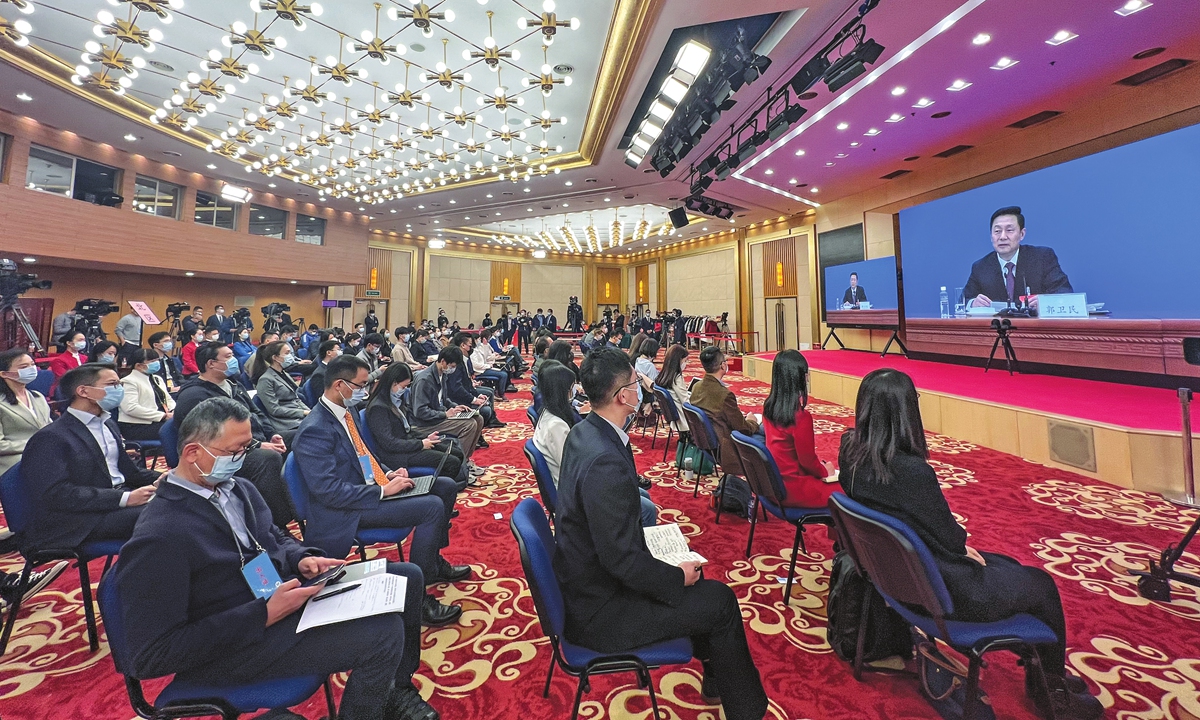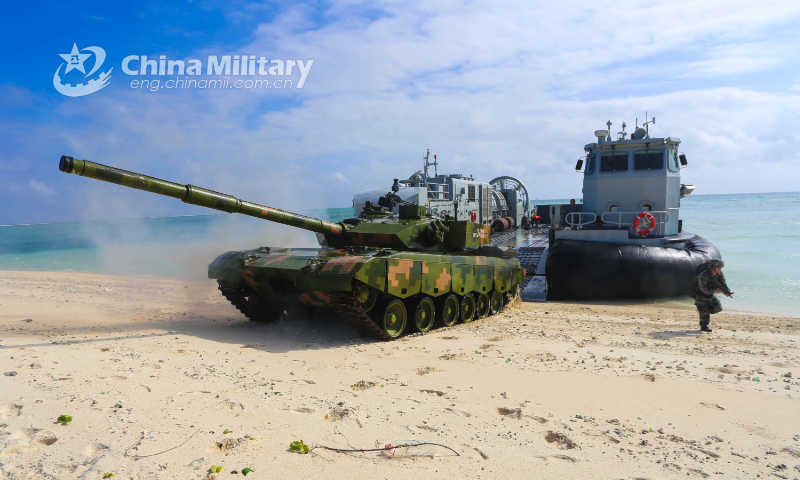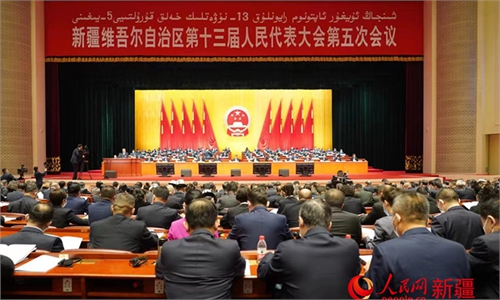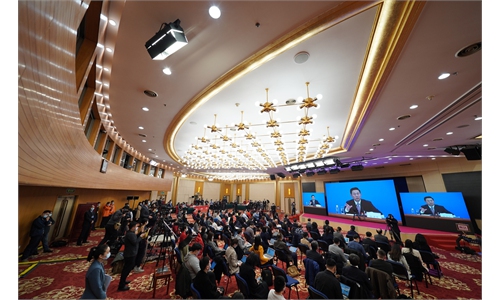
Journalists attend a press conference of the fifth session of the 13th National Committee of the Chinese People's Political Consultative Conference (CPPCC) via video link in Beijing, capital of China, on March 3, 2022. Photo: People's Daily
China officially ushered in the "two sessions" period on Thursday, once again drawing global attention to how the country's two main political bodies will set priorities and plans involving the economy, military, trade, diplomacy, and the environment for the next year. Two sessions this year are held one day before the official opening of the Beijing 2022 Paralympic Winter Games, which is also expected to impress the world with exquisite organization and unforgettable stories.
As one of the most important annual gatherings on China's political calendar, the two sessions have always served as a window for the outside world to observe the country's development and the vitality of socialist democracy with Chinese characteristics.
However, the world has special expectations for this year's two sessions, as they are being convened at an important juncture leading China onto the path of building a modern socialist country and marching toward its second centenary goal. It also comes in a highly anticipated year when the Communist Party of China (CPC) will hold a pivotal meeting - the 20th National Congress of the CPC. This year also marks the second year of China's 14th Five-Year Plan for economic and social development.
Deputies and political advisors reached by the Global Times on Thursday said they are eager to see how the country plans to stabilize the economic growth, deepen reforms to achieve the "dual carbon" goal, resolve thorny livelihood problems, optimize anti-epidemic measures, improve whole-process people's democracy and respond to the complex outside environment.
Meanwhile, China's success in containing COVID-19 domestically and dazzling economic performance as it embraces the Year of the Tiger have intrigued international observers, who now want to learn more about China's "wisdom" and "solutions" through the two sessions - especially in contrast with the struggle many countries in the West are facing in containing the pandemic and saving their fading and tarnished global images.
As the two sessions this year are taking place under the background of escalating Russia-Ukraine tensions, sending shock waves across the world, the crisis is also expected to be a hot topic at the annual press conference of the Chinese foreign minister on the sideline of the NPC session.
Analysts stressed that through the two sessions, China is telling the world that China's development will not only benefit itself, but also contribute to global growth. Concentrating on doing our own affairs well is the consensus of Chinese society.
Meetings under spotlight
Guo Weimin, spokesperson for the fifth session of the 13th National Committee of the Chinese People's Political Consultative Conference (CPPCC), told a press conference on Thursday that the fifth session of the 13th Chinese People's Political Consultative Conference National Committee is set to begin on March 4 and close on March 10.
One of the most closely-watched items on the agenda during the two sessions will be how China will set its official GDP growth target for 2022, as the world's second-largest economy has been driving and leading the development of world growth amid headwinds and under the shadow of the pandemic.
Last year, China's foreign trade exceeded the $6 trillion mark for the first time. China's economic aggregate grew by 8.1 percent year on year, achieving the dual goals of high growth and low inflation. China has also contributed to more than 30 percent of global growth for years and become a driving force for global economic development.
This year's growth target is expected to be revealed at the opening of the National People's Congress session on March 5, when Premier Li Keqiang delivers the annual government work report.
While this year's event comes at a critical time of a surge in Omicron cases, the Russia-Ukraine conflict, and mounting domestic pressure, economists told the Global Times that policymakers are expected to maintain a growth target of above 5 percent with an emphasis on stability for economic development amid a downward global trend.
"I agree with the mainstream prediction of about 5.5 percent growth, which is in line with China's real situation and emphasis on economic stability set by the Central Economic Work Conference," Yu Yongding, a former president of the China Society of World Economics and director of the Institute of World Economics and Politics at the Chinese Academy of Social Sciences, told the Global Times.
The Central Economic Work Conference held in December last year, a key meeting that laid out the economic work for 2022, placed heavy emphasis on economic "stability." The meeting specifically pointed out the triple pressure faced by the Chinese economy - shrinking demand, supply shocks, and weakening expectations.
China has not yet fully used its fiscal policy, and will take a more proactive approach this year to support economic growth, Yu said, noting that infrastructure could become a main driver of China's economic growth.
Despite the challenges, Chinese economists noted that a growth rate of above 5 percent will be a "safe zone" for the Chinese economy, thanks to its solid foundation, sufficient fiscal and monetary tools at the disposal of policymakers, and the resilient industrial chain, which has been tested by the raging coronavirus pandemic over the past two years.
"China has the confidence, conditions and capabilities to achieve stable, healthy and sustainable development of the economy," Guo said at the press conference, noting that China will continue to take solid measures to expand high-level opening up and work to build an open world economy.

An army main battle tank rolls out of a naval air cushioned landing craft during a joint combat training exercise conducted by an army brigade and a naval landing ship group under the PLA Southern Theater Command on Feb.8. (eng.chinamil.com.cn/Photo by Li Jia)
In addition to the GDP target, China's defense budget for 2022 has also prompted widespread speculation. Analysts and observers predict that the country will likely continue to steadily increase its defense expenditure, at a rate that is possibly slightly higher than last year's, and at a time when China is enjoying positive economic development but facing severe security threats, as the two factors have provided a foundation and resulted in the need to further develop its national defense capabilities in order to safeguard national sovereignty, territorial integrity and rightful interests.
The figure is also expected to be released in a draft budget report issued at the opening of the NPC session on Saturday. Multiple military experts reached by the Global Times over the past week believe that the figure could see a growth of about 7 percent.
As China's zero-COVID policy enters its third year, amid concerns over its impact on the economy, particularly manufacturing and the lives of residents, Guo said China has always made safety and health of the people its priority. "It is because of correct epidemic prevention policies that the country has taken the lead in restoring economic growth and ensuring the basic stability of the global industrial and supply chains."
Zhu Zhengfu, a member of the CPPCC National Committee, who came from Guangzhou, South China's Guangdong Province and arrived in Beijing on Thursday, told the Global Times that the anti-epidemic requirements of the two sessions this year are generally similar to those of last year. "We were required to quarantine in a designated hotel in Guangzhou on Wednesday and tested twice for COVID-19. After the results of all members of our group came back negative, we came to Beijing today and had another round of testing when arriving at the designated hotel in Beijing," Zhu said.
NPC deputies and CPPCC members are expected to share their insights on how to further strengthen monitoring and early warnings, increase the precision of prevention and control measures, and balance regional distribution of medical resources to make the public health system more resilient.
Zhu said one of the hottest topics related to social problems this year will be the protection of women's rights in the wake of the tragic woman trafficking case in Jiangsu, and effective improvements on related laws are expected to be made during the two sessions. Meanwhile, a third-child policy, the "double reduction" policy in education, and national security will also be high on the agenda, Zhu predicted.
At Thursday's press conference, spokesperson Guo also criticized American democracy, saying that the US uses it as a pretext to serve its own interests, in response to a question on whether China and the US are vying for a greater say in democracy.
Guo hailed China's "whole-process people's democracy" and the role the CPPCC has played in facilitating scientific and democratic decision-making through consultation, oversight, participation, and cooperation.
Another important item on the agenda of this year's NPC session is a review of the Organic Law of Local People's Congresses and Local People's Governments at all Levels. The draft amendment adds relevant provisions on "upholding the whole process of people's democracy" to local people's congresses at all levels and local people's governments.
Focus on own development
The two sessions play an important role in Chinese people's political lives, as the annual political event reflects the orderliness of democracy.
while NPC deputies and political advisors, unlike representatives or senators in the West, can better represent the public's real demands and opinions, said Yang Xuedong, a professor of political science at Tsinghua University.
Through the two sessions, China will send two important messages to the world. First, stability is the top priority. Governments of all countries should first focus on solving their own internal problems by developing the economy, addressing various concerns related to people's livelihood and protecting the interests of minority groups and special groups, Yang said.
More importantly, it tells the world that the development of a country should not come at the expense of the development of other countries, and should be aimed at benefiting more people and even promoting the development of the world, the expert said.
Echoing Yang, Fang Peng, a member of the Chinese Association of Hong Kong & Macao Studies, told the Global Times on Thursday that the two sessions send a signal to the world that the CPC always puts its main focus on China's domestic affairs - maintaining the well-being of the Chinese people and the stability, unity and prosperity of the country.
From Iraq and Afghanistan to Ukraine, as the US and the West showed a declining ability in handling global affairs, China has set an example to the international community that "doing your own thing well" is the greatest contribution to the world, said Fan.



